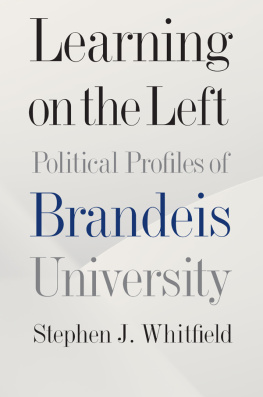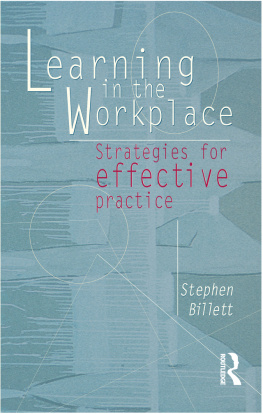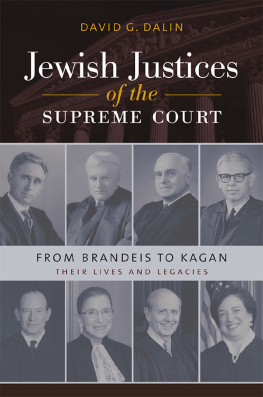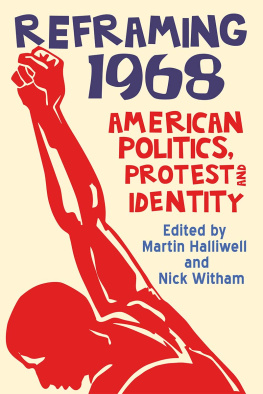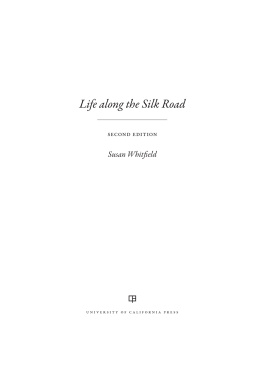Stephen J. Whitfield - Learning on the Left: Political Profiles of Brandeis University
Here you can read online Stephen J. Whitfield - Learning on the Left: Political Profiles of Brandeis University full text of the book (entire story) in english for free. Download pdf and epub, get meaning, cover and reviews about this ebook. year: 2020, publisher: Brandeis University Press, genre: Politics. Description of the work, (preface) as well as reviews are available. Best literature library LitArk.com created for fans of good reading and offers a wide selection of genres:
Romance novel
Science fiction
Adventure
Detective
Science
History
Home and family
Prose
Art
Politics
Computer
Non-fiction
Religion
Business
Children
Humor
Choose a favorite category and find really read worthwhile books. Enjoy immersion in the world of imagination, feel the emotions of the characters or learn something new for yourself, make an fascinating discovery.
- Book:Learning on the Left: Political Profiles of Brandeis University
- Author:
- Publisher:Brandeis University Press
- Genre:
- Year:2020
- Rating:5 / 5
- Favourites:Add to favourites
- Your mark:
- 100
- 1
- 2
- 3
- 4
- 5
Learning on the Left: Political Profiles of Brandeis University: summary, description and annotation
We offer to read an annotation, description, summary or preface (depends on what the author of the book "Learning on the Left: Political Profiles of Brandeis University" wrote himself). If you haven't found the necessary information about the book — write in the comments, we will try to find it.
Learning on the Left: Political Profiles of Brandeis University — read online for free the complete book (whole text) full work
Below is the text of the book, divided by pages. System saving the place of the last page read, allows you to conveniently read the book "Learning on the Left: Political Profiles of Brandeis University" online for free, without having to search again every time where you left off. Put a bookmark, and you can go to the page where you finished reading at any time.
Font size:
Interval:
Bookmark:

Brandeis University Press
2020 Brandeis University Press
All rights reserved
Manufactured in the United States of America
Designed by Richard Hendel
Typeset in Miller and Didot by Passumpsic Publishing
For permission to reproduce any of the material in this book, contact Brandeis University Press, 415 South Street, Waltham MA 02453, or visit http://www.brandeis.edu/press.
Library of Congress Cataloging-in-Publication Data available upon request
Hardcover ISBN: 978-1-68458-011-8
Ebook ISBN: 978-1-68458-012-5
5 4 3 2 1
To the students
I have been
fortunate enough
to know
In the spring of 1982, historian Morton Keller served as Harmsworth Visiting Professor of American History at Queens College, Oxford. While there, he was given a chance to meet the Patroness of the College, the Queen Mother herself. Upon meeting the visitor from the United States, she inquired where he usually taught. Brandeis, maam, Keller responded. The Queen Mother sighed: There are so many new universities today. At last count, the United States harbors well over four thousand colleges and universities. This book depicts only one of them. It is not an institutional history. No scholarly history of Brandeis exists, nor is this volume bucking to be so regarded. It does not aspire to provide a record of campus activities and issues. Instead, Learning on the Left recounts part of the past of a university that is distinctive, because it hired faculty members and produced students who made a difference in American politics. They became noteworthy as political activists, as political thinkers, and as political writers. They exerted considerable influence in a nation that achieved its independence two centuries before Kellers encounter with the Queen Mother. Within the boundaries of American politics, this particular university has punched above its weight. That is the thesis of this book.
The case presented here is cumulative, so depth must be sacrificed to breadth, though the endnotes can serve to supply a fuller paper trail. Because Brandeis was founded as recently as 1948, any historical account is bound to be How effectively these elements were reconciled in the lives and works of faculty and alumni can be judged from the following pages. What unites the figures portrayed in this book is of course their affiliation with the university. But no study of their political salience can be circumscribed to the campus; the careers that they forged afterward (and sometimes before) must be traced to verify the argument of this book. Their lives and their ideas testify to the significance of what these figures did when they were not inhabiting classrooms in Waltham, Massachusetts.
The portraits are therefore largely extracurricular, and the implications may well resonate beyond the Brandeis campus. They also constitute a case study of the fate of liberalism, a term that has had a heavy workout in Western thought over the span of a couple of centuries. How might it be defined? In the United States, in the second half of the twentieth century, a keen devotion to the ideal of an open society, as well as protection of disfavored minorities in particular, is what separated liberals from conservatives. The left has tended to favor change over stability, to prefer liberty over authority, to seek remedies in government rather than to cut slack to corporations, and to invest in hopes for a better future more than in reverence for the past. For the first fifteen years or so of Brandeis University, the progressivism of its faculty and students diverged from the national mood of conservatism. For the next decade or so, liberalism was subjected to pressure from a nascent militant left. Animated by greater urgency than liberals, radicals have been more sensitive than others to economic injustice, and their challenge to the limits of postwar liberalism also partakes of the story. Republicans have served on the faculty and could be found in the student body. So have conservatives. But their influence never remotelymatched the role that socialists as well as liberals played in the earliest decades of the university, and that liberals have played all the way down to the present.
In tracking how a new educational institution affected the nations politics, many ways of telling this story are available. Here its structure is thematic. Its span briefly includes the twenty-first century. Yet Learning on the Left is also weighted heavily toward the first three postwar decades. That is because an act of more distant historical retrieval is more urgent and more necessary than when memories are fresher and the actuarial tables have yet to take full effect. When Brandeis was tiny, with graduating classes in the low three figures, its faculty in particular took on a larger-than-life impact that was bound to be reduced as the size of the community grew. But the top-heavy chronological emphasis has a further justification. Like virtually all other American campuses, Brandeis became depoliticized by the end of the 1970s. Protests became rarer and less disruptive. Faculty and alumni continued to serve as an index of the vicissitudes of the public culture, but the political profile of the institution became much less odd and less noticeable. No emphatically conservative perspective emerged, but campus discussion of public issues became far less impassioned.
Because Learning on the Left mostly belongs to the genres of political and (somewhat less so) intellectual history, entire disciplines that are essential to a liberal arts curriculum are ignored. In 2017 two faculty members arrived in Stockholm to share a Nobel Prize in Physiology or Medicine (though Brandeis lacks a medical school). The research of neuroscientists Jeffrey Hall and Michael Rosbash in circadian rhythms has no overt political implications, so such scientists are absent from the pages that follow. So is Roderick MacKinnon 78, a biochemistry major, who won a Nobel Prize in Chemistry in 2003 for discoveries concerning channels in cell membranes. The creative arts are also omitted (with a few exceptions), as are the classics. Yet even such fields as anthropology and economics are largely neglected. The most famous account of faculty-student relations at Brandeis is undoubtedly Tuesdays with Morrie: An Old Man, a Young Man, and Lifes Greatest Lesson (1997). Mitch Albom 79, who majored in sociology, wrote this memoir of his friendship with a former professor, Morris S. Schwartz (191695); and the book remained on the best-seller lists in both hardcover and paperback for more than seven years.produced five subsequent number 1 best sellers, but any assessment of their impact (in forty-two languages) belongs in a very different book.
Did Brandeis University decisively shape what its faculty members and alumni have said and done in American political history? How big a difference did Brandeis make in stimulating or encouraging or reinforcing the political ideas and commitments to which the men and women in this book subscribed? No answer can be satisfactory; no stab at generalization can be much more than guesswork. Coincidence cannot be discounted. Some faculty members were only briefly employed at Brandeis. Some arrived with their political views already fully formed. Take the most famous person ever to teach at Brandeis. She once confided to a friend that she would have voted socialist in 1932 (the candidate was Norman Thomas), but for the impediment that her own husband was running for the presidency too. His name was Franklin D. Roosevelt. Others associated with Brandeis developed their most important ideas only after leaving Brandeis, and then may have significantly revised or even repudiated them. Difficulties of generalization became evident in a 2011 monograph that the firm of Couleurs Livres published in Brussels. The ten intellectuals who were profiled personified the
Font size:
Interval:
Bookmark:
Similar books «Learning on the Left: Political Profiles of Brandeis University»
Look at similar books to Learning on the Left: Political Profiles of Brandeis University. We have selected literature similar in name and meaning in the hope of providing readers with more options to find new, interesting, not yet read works.
Discussion, reviews of the book Learning on the Left: Political Profiles of Brandeis University and just readers' own opinions. Leave your comments, write what you think about the work, its meaning or the main characters. Specify what exactly you liked and what you didn't like, and why you think so.

